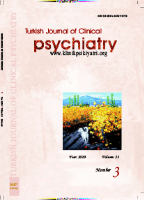
WORLD JOURNAL OF BIOLOGICAL PSYCHIATRY
Scope & Guideline
Advancing Understanding in Biological Psychiatry.
Introduction
Aims and Scopes
- Biological Mechanisms of Mental Disorders:
The journal emphasizes the exploration of biological underpinnings of psychiatric conditions, including genetic, neurobiological, and immunological aspects that contribute to the onset and progression of mental illnesses. - Innovative Treatment Approaches:
Research on novel therapeutic interventions, including pharmacological treatments, psychotherapy modalities, and integrative approaches, is a core focus, highlighting advancements in treatment efficacy and safety. - Psychiatric Epidemiology and Public Health:
The journal frequently publishes studies that investigate the prevalence, risk factors, and societal impacts of psychiatric disorders, aiming to inform public health strategies and mental health policies. - Translational Research:
A significant aim is to bridge basic scientific research with clinical applications, facilitating the translation of findings from the laboratory to the clinic to improve patient outcomes. - Psychosocial Factors in Mental Health:
Exploration of the interplay between psychosocial factors and biological aspects of mental health, including the impact of stress, trauma, and social determinants on psychiatric disorders.
Trending and Emerging
- Neuroinflammation and Immune System Interactions:
There is an increasing interest in understanding the role of neuroinflammation and the immune system in psychiatric disorders, linking these biological factors to symptoms and treatment outcomes. - Personalized Medicine and Pharmacogenetics:
Emerging research focuses on personalized treatment approaches, including pharmacogenetic testing and tailored pharmacotherapy, aiming to optimize treatment strategies for individual patients. - Impact of the Gut-Brain Axis:
The exploration of the gut-brain axis and its influence on mental health is gaining traction, with studies investigating how gut microbiota can affect psychiatric symptoms and treatment responses. - Technology and Digital Interventions:
Research into the use of technology, including telepsychiatry and digital therapeutic interventions, has become prominent, especially in the context of the COVID-19 pandemic and its aftermath. - Epigenetics in Psychiatry:
The field is witnessing a rise in studies examining epigenetic mechanisms and their implications for understanding the biological basis of psychiatric disorders, particularly in relation to stress and trauma.
Declining or Waning
- Traditional Psychopharmacology:
Research focused solely on traditional psychopharmacological approaches appears to be decreasing, as there is a growing preference for studies integrating biological mechanisms with psychosocial interventions. - Single-Factor Models of Mental Health:
There is a noticeable decline in studies that consider psychiatric disorders through a single-factor lens, such as purely genetic or purely environmental models, as the field increasingly recognizes the need for a multidisciplinary approach. - Animal Models of Mental Disorders without Translational Relevance:
The use of animal models that lack clear translational relevance to human psychiatric conditions is waning, with more emphasis placed on studies that can directly inform clinical practice.
Similar Journals

COMPREHENSIVE PSYCHIATRY
Elevating the standards of psychiatric research and practice.COMPREHENSIVE PSYCHIATRY is a leading peer-reviewed journal dedicated to advancing the field of psychiatry and mental health, published by W B SAUNDERS CO-ELSEVIER INC. With its Q1 designation in both Clinical Psychology and Psychiatry and Mental Health, this journal ranks impressively, holding the 9th position out of 311 in Clinical Psychology and the 27th position out of 567 in Psychiatry and Mental Health according to Scopus metrics. Since transitioning to Open Access in 2019, COMPREHENSIVE PSYCHIATRY has significantly increased its accessibility, enabling a broader audience of researchers, mental health professionals, and students to engage with cutting-edge research and clinical practices. The journal's scope encompasses a wide array of topics, including but not limited to evidence-based interventions, psychological evaluations, and the latest empirical studies in the field. As we continue to navigate the complexities of mental health in contemporary society, this journal serves as a vital resource for disseminating impactful findings and fostering collaborative discourse among scholars and practitioners globally.

PSYCHIATRY-INTERPERSONAL AND BIOLOGICAL PROCESSES
Cultivating Knowledge at the Intersection of Psychiatry and RelationshipsPSYCHIATRY-INTERPERSONAL AND BIOLOGICAL PROCESSES, published by Routledge Journals, Taylor & Francis Ltd, is a pivotal journal in the field of psychiatry, focusing on the intricate interplay between interpersonal relationships and biological factors in mental health. Established in 1938, the journal has cultivated a rich legacy of scholarship, with a projected convergence of research extending to 2024. With an impact that resonates through its Q2 ranking in Medicine (miscellaneous) and Q3 in Psychiatry and Mental Health as of 2023, it ranks 325th among 567 in its category on Scopus, highlighting its relevance and reach within the academic landscape. While it is not an open-access journal, it serves a vital role in disseminating cutting-edge research, encouraging multidisciplinary dialogue among researchers, clinicians, and students alike. The journal’s dedication to exploring complex psychiatric issues makes it an indispensable resource for advancing knowledge and enhancing clinical practice in mental health.

Alpha Psychiatry
Connecting Scholars to Tackle Contemporary Mental Health Challenges.Alpha Psychiatry, published by AVES, stands at the forefront of mental health research and psychiatric advancements. With a commitment to disseminating high-quality and impactful studies, this journal serves as a critical platform for scholars, clinicians, and students interested in exploring the complexities of psychiatric disorders and treatment methodologies. Although the impact factor and specific scope details are still evolving, Alpha Psychiatry is dedicated to fostering interdisciplinary dialogue and promoting innovative research that tackles contemporary challenges in the field of psychiatry. As an open-access journal, it ensures that research is widely accessible, enhancing knowledge transfer and collaboration within the global scientific community. Located in Istanbul, Turkiye, the journal proudly represents a rich academic tradition, aiming to contribute significantly to the global discourse on mental health.

BMC Psychiatry
Empowering minds with groundbreaking psychiatric studies.BMC Psychiatry is a leading open-access journal published by BMC, dedicated to advancing the field of psychiatry and mental health. With its E-ISSN 1471-244X, the journal has been at the forefront of disseminating high-quality research since its inception in 2001, and it proudly maintains a Q1 ranking among psychiatry and mental health journals, reflecting its significant impact and relevance within the research community. Based in the United Kingdom, BMC Psychiatry boasts a commendable Scopus ranking of #158 out of 567 in the psychiatry and mental health category, placing it in the 72nd percentile. The journal serves as a vital platform for scholars, clinicians, and students alike, providing them with access to groundbreaking studies, innovative methodologies, and emerging trends in mental health. By fostering a collaborative environment, BMC Psychiatry not only enriches the academic landscape but also contributes to evidence-based practice and policy in mental health care.

ACTAS ESPANOLAS DE PSIQUIATRIA
Exploring innovative solutions in mental health care.ACTAS ESPANOLAS DE PSIQUIATRIA, published by the renowned JUAN JOSE LOPEZ-IBOR FOUNDATION, serves as a vital resource in the field of psychiatry and mental health, particularly within the Spanish-speaking academic community. With its ISSN 1139-9287 and E-ISSN 1578-2735, this journal has been a critical platform for disseminating high-quality research since its inception in 1996 and continues to contribute valuable insights until 2024. As a recognized journal in the Q3 category of psychiatry and mental health, it ranks 387 out of 567 in Scopus, placing it within the 31st percentile, thereby indicating a growing influence among its peers. The journal’s open access options enhance its accessibility, encouraging a broader readership to engage with contemporary research issues in mental health. Researchers, professionals, and students alike will find ACTAS ESPANOLAS DE PSIQUIATRIA essential for staying informed on the latest developments and innovations in psychiatric practice and research.

Brazilian Journal of Psychiatry
Advancing mental health through cutting-edge research.The Brazilian Journal of Psychiatry is a prominent peer-reviewed journal dedicated to advancing the field of psychiatry and mental health, published by the Associação Brasileira de Psiquiatria. With an impressive Q2 ranking in the Psychiatry and Mental Health category for 2023 and a Scopus rank of #130 out of 567, this journal serves as a vital resource for researchers, clinicians, and students alike. Since its transition to Open Access in 1999, it has aimed to disseminate high-quality research, innovative practices, and critical insights relevant to mental health in Brazil and beyond. The journal's focus spans various topics in psychiatry, aiming to bridge the gap between research and clinical application, making it essential reading for professionals and academicians committed to improving mental health outcomes. With a commitment to fostering scholarly discourse, the Brazilian Journal of Psychiatry not only enriches the academic landscape but also enhances the practice of psychiatry through its widespread accessibility and dedication to excellence in research.

BJPsych Open
Exploring the forefront of psychiatry and mental well-being.BJPsych Open, published by Cambridge University Press, is a leading open access journal dedicated to the field of psychiatry and mental health. Since its inception in 2015, the journal has provided a platform for disseminating cutting-edge research and evidence-based practices, making significant contributions to the academic community. With an impressive impact factor and currently ranking in the top Q1 quartile of its field, BJPsych Open is recognized for its rigor and relevance, ranking 138 out of 567 journals in psychiatry and mental health according to Scopus, placing it in the 75th percentile. The journal's commitment to open access enhances visibility and accessibility, ensuring that vital research is available to a global audience. Researchers, professionals, and students alike will find valuable insights into contemporary mental health challenges and innovative treatment approaches, making BJPsych Open an essential resource for advancing mental health scholarship.

INTERNATIONAL JOURNAL OF LAW AND PSYCHIATRY
Navigating the Confluence of Justice and Mental WellnessThe INTERNATIONAL JOURNAL OF LAW AND PSYCHIATRY, published by PERGAMON-ELSEVIER SCIENCE LTD, stands as a pivotal resource in the intersection of legal studies and psychological research. With an ISSN of 0160-2527 and E-ISSN 1873-6386, this journal covers a broad spectrum of topics from the complexities of mental health law to the implications of psychiatric assessments in jurisprudence, making it a valuable asset for researchers and practitioners alike. It enjoys impressive rankings, placing in the top quartiles across multiple categories in the 2023 Scopus index: Q1 in Law and Pathology & Forensic Medicine, and Q2 in Psychiatry and Mental Health, highlighting its significance and impact in these fields. This journal, accessible to scholars globally, fosters important discussions and advancements in understanding the interrelation of law and mental health, providing a forum for innovative research and critical reviews. With publication convergence spanning from 1978 to 2024, it continues to shape the discourse in law and psychiatry and remains essential for anyone seeking to stay informed on contemporary issues and research in these dynamic fields.

Klinik Psikiyatri Dergisi-Turkish Journal of Clinical Psychiatry
Exploring the Depths of Psychiatry and Mental WellnessKlinik Psikiyatri Dergisi - Turkish Journal of Clinical Psychiatry is a distinguished open-access journal dedicated to the evolving field of psychiatry and mental health. Published by KLINIK PSIKIYATRI DERGISI in Turkey since 1998, this journal aims to provide a platform for the dissemination of research, clinical studies, and reviews that contribute to the understanding of psychological disorders and treatment methodologies. With an ISSN of 1302-0099 and an E-ISSN of 2146-7153, the journal is indexed in various databases, although it currently holds a rank of 460/567 in the Scopus ranking for the category of Medicine: Psychiatry and Mental Health. The journal operates under an open-access model, ensuring that research findings are readily accessible to a wide audience, contributing to greater knowledge and awareness in the field. As it converges from 2017 to 2024, Klinik Psikiyatri Dergisi continues to strive for excellence, providing valuable insights and resources for researchers, professionals, and students interested in the complexities of mental health.

Rivista di Psichiatria
Uniting Disciplines for a Comprehensive Approach to PsychiatryRivista di Psichiatria, published by PENSIERO SCIENTIFICO EDITORE, stands as a significant contributor to the field of Psychiatry and Mental Health since its inception in 1975. With an ISSN of 0035-6484 and an E-ISSN of 2038-2502, this esteemed journal offers a platform for rigorous academic discourse and cutting-edge research, helping to shape contemporary psychiatric practices and theories. Currently holding a Q2 designation in Psychiatry and Mental Health based on the 2023 category quartiles, and ranking #197 out of 567 in Scopus, it reflects a commendable 65th percentile among its peers. The journal welcomes contributions that encompass a broad range of topics related to mental health, encouraging contributions from a multidisciplinary approach, which aids in its goal of advancing the understanding and application of psychiatric science. While it is a traditional journal without Open Access options, access to its valuable content can support researchers, clinicians, and students in their pursuit of knowledge and innovation within the field. Situated in Rome, Italy, at VIA SAN GIOVANNI VALDARNO 8, ROME 00138, the journal continues to enhance its rich legacy, promoting the exchange of ideas and fostering collaboration amongst practitioners and scholars alike.